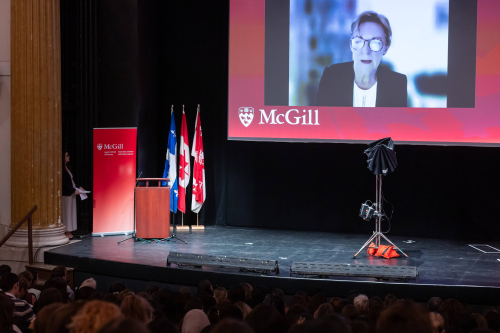Fierce wildfires. Record setting heat. Atmospheric rivers. Bomb cyclones. Rising ocean temperatures. These and many other disasters have made headlines, particularly this past summer, revealing a climate in severe distress. As Fiona Hanley, RN, MSc(N), pointed out in her keynote speech at the Ingram School of Nursing’s recent Nursing Professionalism Ceremony, “Climate change, biodiversity loss, pollution, pandemics, and social injustice are all inter-connected. We are facing a global crisis that threatens the health and well-being of all living beings on this planet.”
A nurse educator and faculty lecturer at the Ingram School of Nursing (ISoN), Ms. Hanley is a founding member of the Canadian Association of Nurses for Health and the Environment (CANE) and Chair of its Environmental Justice and Reconciliation Committee. As she explained, planetary health is founded on the imperative of respecting and preserving the health and well-being of the natural world, drawing on research and wisdom from a variety of disciplines. “Planetary health is an evolving movement, a scientific field, and worldview informed by Indigenous knowledges and long-held understandings of the interconnectedness of people with nature, other species and the natural world,” she said.
Ms. Hanley drew parallels between planetary health and Strengths-based Nursing and Healthcare (SBNH), a value-driven philosophy and approach to care that underpins the nursing curriculum at the ISoN. She noted that, “Just as SBNH helps us to focus on what we can do, what resources we can help our patients and families build on in coping with their health challenges, so planetary health helps guide us in widening our focus, not ignoring the difficulties or challenges, but seeing the strengths we can build on in collective efforts to address them.”
While eco-anxiety can lead to despair, Ms. Hanley encouraged students to take action, both individually and by joining groups such as McGill Nurses for Planetary Health. As well, she pointed to an ever-increasing body of tools, resources and action plans such as the Nursing Toolkit for Planetary Health launched this past summer. Developed jointly by the Canadian Association of nurses for the Environment and Canadian Federation of Nurses Unions, this toolkit offers practical guidance to hospital-based nurses on addressing climate change and planetary health in clinical practice, direct patient care, on the unit or hospital-wide level.
Ms. Hanley concluded her talk by reminding the students that they can have a positive impact on shaping the future they wish to see. “As future SBNH nurses, you have the power and the responsibility to make a difference in the health of both people and the planet.”

